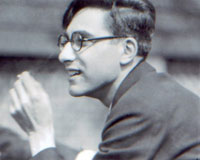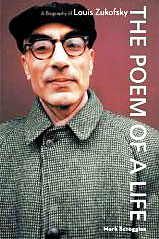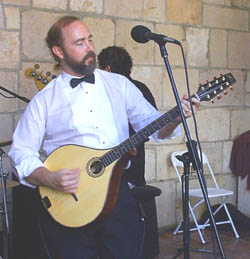
| Jacket 35 — Early 2008 | Jacket 35 Contents page | Jacket Homepage | Search Jacket |
The Internet address of this page is http://jacketmagazine.com/35/r-scroggins-rb-manning.shtml
Mark Scroggins
The Poem of A Life: A Biography of Louis Zukofsky
reviewed by Nicholas Manning
572pp. Shoemaker Hoard. Hardback. U.S. $30.00. 1-59376-158-9
This review is about 7 printed pages long. It is copyright © Nicholas Manning and Jacket magazine 2008.
1
There is little to ‘tell’ about Louis Zukofsky, but there is everything, as the poet himself may have put it, to see, to hear, and to understand. In Zukofsky, we are confronted not so much with a ‘life’ of dates, names and occurrences, as with the growth and change, the coming to be in and through time, of a consciousness. ‘Sight, sound, and intellection’[1]: if the model for this now overly familiar Zukofskian mantra is in part Pound’s phanopeia, melopeia, logopeia, Zukofsky everywhere suggests to us that in order to better understand what truly constitutes his, or any, ‘life’, we may perhaps need to look, listen, and comprehend, in a more personal, less normative, way.

Louis Zukofsky. Jacket 30 has a feature on Zukofsky with sixteen articles by various hands.
2
I mean to suggest that Louis Zukofsky is a unique candidate for poetic biography in that his relationship to the overtly complex semantic unit we call ‘life’ puts into question our very definition of this term. When we say, for instance, as Zukofsky himself claimed, that the poet’s magnum opus “A” constitutes ‘a poem of a life’, precisely what type of ‘life’ do we mean? After all, Zukofsky’s ‘life’ seems composed less of notable biographical ‘events’ than of the writing of a consciousness, and the contiguous consciousness of a writing.
paragraph 3
Like any life? Yes. Save that, to write the biography of a figure such as Pound or Eliot demands a deeper foray into a dialectical morass of politics, psychologies, ideologies and histories. Though these concerns, in reference to Zukofsky, are inescapably pertinent, I would suggest that they constitute less a discursive foreground than a contextualization, a situation.
4
For this reason, it might be profitable to first situate Mark Scroggins’s extraordinary critical biography in the context of the distinction, so crucial in Heideggerien philosophy, and which the German language operates efficiently, between Ereignis and Erlebnis. Though both terms translate the English notion of ‘event’ or ‘experience’, there is an important difference. For if our idea of Erlebnis is fairly clear — something close to the English rendition of ‘lived experience’ — the proximate definition of Ereignis has proved infamously conjectural[2].

5
And so it should. For it is precisely this markedly more complex notion that Zukofsky’s poetic appears to strive so consistently to weave, to unweave, and to decorate. My question, then, is what are we to make of the detailing of the events of a ‘life’ which on the surface appears so consistently ‘uneventful’? To write a biography of Louis Zukofsky constitutes in this way a different task to the writing of a biography of his Modernist predecessors. It is no less difficult, but it is surely difficult for different reasons.
6
For what, precisely, did Zukofsky do? He travelled little. He fought no wars. He wasn’t prone to extravagances of ideological idealism like some of his (supposedly ‘anti-romantic’) forbears. His aesthetic and political proposals are, though often prolix and a touch opaque, consistently interesting, and eminently reasonable. Moreover, any controversies associated with Zukofsky seem most often, as in the case of the much maligned nomenclature of Marianne Moore and the ‘Objectivists’, to be not principally of his own volition.
7
His cultural heritage — in this case that of a first-generation Jewish-American immigrant — decidedly informs his poetic, without entirely constituting its raison d’être. For better or for worse, we perhaps do not feel the same imperative when reading Zukofsky of situating his poetic uniquely within the lineage of the Shoah and its painful historical Diaspora. It is there, of course, it is important, but it is not everything.
8
For all these reasons, it seems easier to see what a biography of Zukofsky could not be, rather than what it could. It cannot, thankfully, be the roman d’aventure of a Benita Eisler’s Byron: Child of Passion, Fool of Fame[3]. (Indeed it seems almost comical to think of Zukofsky — a poet for whom, like us, the buying of a new house or apartment seems sometimes a decade-defining experience — in these event-oriented terms). Nor however can it be quite the critical history of a Zukofskian ‘era’ in the sense of a Hugh Kenner, as Zukofsky is a figure around whom it is difficult to imagine an era being oriented. The primary reason is perhaps that he is a poet who would attempt to question and contradict such generalizations, as he would question, almost for the rest of his life, the relevance of the term ‘Objectivist’.
9
Importantly, Zukofsky’s own vision of history, and in particular of the role of the poet as possible historian, reflects these concerns. As the poet remarks in “A”-22:
10
History’s best emptied of names’
impertinence met on the ways:
shows then the little earth
at regard of the heavens[4]
11
These ‘names’ of history, we feel, are ‘impertinent’ in both possible senses of the word: at once by their being ‘irrelevant’, or non-pertinent, but also ‘impudent’ or ‘disrespectful’, in that they over-emphasize the important of the specifically human histories which, once we have turned our ‘regard’ to the heavens, pale into a receding cosmological perspective.
12
This is simply to say that for Zukofsky, and in a pre-eminent way in the history of 20th century American poetics, any Erlebnis is but part of a larger Ereignis; and the biographer’s task has perhaps as its major imperative the attempted discovery of what lies beyond the mere ‘events’ of this ‘life’, or their ostensible absence. Though the ‘events’ (Erlebnis) of Zukofsky’s life are always attentively detailed in Mark Scroggins’s work — from the early then maturing relationship with Pound, to the ‘Objectivist’ issue, the brief European tour, the difficulties of publication, and the late dawning of critical respect — Zukofsky’s best biographer to date gives us more than this. For Scroggins seems aware, to a heightened degree, that to concentrate on the mere ‘nomenclature’ of Zukofsky’s life would be an error. And this is why we feel grateful for the deeply perceptive methodology — to use another word dear to the poet — that Zukofsky’s biographer here employs.
13
There is a tendency, in the reviewing of biographies, to talk more of the biography’s nominal ‘content’ than of its general methodology. This trend surreptitiously intimates that biographical writing does not require, for each instance, its own complex and unique vision, to be suited in each case to the ‘life’ the reader would like to live momentarily, and partially know.
14
I say this because I am less interested here in detailing for the reader the dates, names and occurrences of Louis Zukofsky’s ‘lived experience’ — for that I invite you to buy the book here under review — than I am in talking of the way in which Mark Scroggins sets about dealing with his subject in a singularly innovative way.
15
Let me first note that The Poem of A Life is composed of two types of chapter. The first, primarily chronological, carries forward the ‘narrative’ aspects of Zukofsky’s experience. These sections are then interspersed with what Scroggins’s calls ‘interchapters’, and which amount to a series of illuminating studies of specific aspects of Zukofsky’s poetry, theory and influences: from his undergraduate engagement with the work of Henry Adams to crucial and specifically Zukofskian motifs such as number symbolism, geometry, quotation, vision, time, Spinoza and Shakespeare.
16
I think it’s not too audacious to suggest that what is fascinating about this approach, with its emphasis on collage, concentration, and disruption as biographical procedure, is the degree to which it mirrors Zukofsky’s own, even down to the very form of “A” itself.
17
Now, this said, “A” is of course an immensely various poem, in its ‘subjects’ as much as in its modes and registers. But if one element stays rather consistent right up until the development of Zukofsky’s ‘late-style’ in the Catullus translations and 80 Flowers, it is perhaps Zukofsky’s comfort with the complex interwoven use of theme and variation: that limpid to and fro between external stimuli and internal particulars which we have come to associate so closely with the entirety of his poetics.
18
If “A” is, then, for Zukofsky, a ‘poem of a life’, it is more often, as in Mark Scroggins’s biography, a life seen through a poem than this equation’s inverse. This is to say that the ‘poem’, in Scroggins’s biographical methodology, does not ‘take precedence’ over the life, but rather serves as a prism — or dare I more mischievously say, as an ‘objective’ ? — through which the life is allowed to refract, assuming thus the full colours of its potential perceptive spectrum.
19
The general perspective thus adumbrated, a few specifics must be singled out. It is refreshing to see deserved attention accorded to Celia Zukofsky’s pivotal role in the creation, development, fruition and conservation of her husband’s work. Her role, as Scroggins makes clear, needs to be seen less as that of a ‘facilitator’ than as a veritable ‘collaborator’: as being the singular artistic influence who, at a specific and important moment in Zukofsky’s poetic evolution, directed his poetics more and more towards the sonically-oriented triumphs of his latest work.
20
The one controversial point will perhaps be Scroggins’s decision — in contrast to the approach of other critics[5] — not to deal with the so-called ‘Niedecker question’. Scroggins in fact deals with this episode in an appendix[6], where he lays out his reasoning regarding the omission of perhaps the most contentious episode in Zukofsky’s life:
21
As attractive as the genre of literary gossip may be, I am unwilling to accept Reisman’s two documents at face value… At best, these two accounts are long-after-the-fact memories of a profoundly biased participant; at worst, they are reconstructions of history driven by resentment.
22
Far from appearing, as I initially feared, a hagiographic brushing-over of uncomfortable and unfavourable intimate details, this decision by Scroggins to err on the side of omission seems, in this case, to be rather more motivated by factual integrity than by any degree of moralistic reserve. It appears, at least to this reviewer, concerned not with taking sides, but rather with the demonstration of an absence of specific facts which might enable us to do so.

Mark Scroggins
23
Reservations? There are few. Scroggins’s prose style, especially when explicitly juxtaposed against Zukofskian circumlocution, seems sometimes a touch too functional, though its clarity is always appreciable. It is interesting in this sense to attempt to posit the possible audience of the work, as it seems to quite explicitly situate itself between a tone of accessible ‘vulgarisation’ — as the French say — and a more specialist critical register. Most often this dual purpose functions well, with only a few occasional slips: I’m not entirely sure, for instance, that it’s necessary to inform readers, especially in the body of a paragraph, that Lenin was ‘the leader of the Bolshevik Revolution’. Perhaps a degree of twentieth century historical grounding could be taken for granted? (Then again, perhaps not).
24
Enough requisite quibbling. Let me leave the almost last word to Louis Zukofsky himself:
25
To write poems is not enough if they do not keep the life that has gone. To write poems may never seem enough when they speak of a life that has gone.[7]
26
The reason why Mark Scroggins may comfortably assume his place with the likes of Charles Bernstein and Guy Davenport in the lineage of key Zukofskian exegetes, is that he has indeed kept this life, as Zukofsky puts it, without reducing it to the dating and naming which, also according to the poet, may deprive it of its many privileged intimacies.
27
If poetry, for Zukofsky, allows us to enter into a fortunate space of emotion, perception and intellection, where we are for once given the chance to think ‘with things as they exist[8]‘, we feel here then that we are thinking with Louis Zukofsky, in a simple, but respectful, simultaneity.
[1] Zukofsky, Louis. A Test for Poetry, 1948, p. vii. Also quoted in Scroggins, Mark, The Poem of A Life: A Biography of Louis Zukofksy. Shoemaker Hoard, 2007, 43.
[2] Possible translations generally express the notion of an ‘owned’ or ‘possessed’ event, Ereignis being thus rendered as ‘event as enowning’ or ‘event as propriation’. It is also interesting to note in passing however, given the Zukofskian obsession with visuality, that one possible root of Ereignis is Augen (‘eye’).
[3] Eisler, Benita. Byron: Child of Passion, Fool of Fame. Knopf, 1999.
[4] Zukofsky, Louis. “A”. Baltimore: Johns Hopkins University Press, 1993, p. 511.
[5] See Penberthy, Jenny, ed. Lorine Niedecker: Woman and Poet. Orono: National Poetry Foundation, 1996, 35—38. Also referenced in Scroggins, Mark, 474.
[6] Scroggins, Mark. ‘Zukofsky, Reisman, Niedecker’ in The Poem of A Life: A Biography of Louis Zukofksy. Shoemaker Hoard, 2007, 473—475.
[7] Zukofsky, Louis in Scroggins, Mark. The Poem of A Life: A Biography of Louis Zukofksy. Shoemaker Hoard, 2007, 226.
[8] Zukofksy, Louis. Prepositions : the collected critical essays. ed. Mark Scroggins. Wesleyan University Press, 2000, 13.

Nicholas Manning
Nicholas Manning teaches comparative poetics at the University of Strasbourg, France. In 2004 he took his MA from the Sorbonne, and from 2003—2006 held a scholarship at the Ecole normale supérieure of the rue d’Ulm. His PhD thesis concerns questions of rhetoric and sincerity in contemporary European and American poetics, with chapters devoted to the poetry of Louis Zukofsky. His chapbook Novaless I-XXVI is available from Achiote Press, (www.achiotepress.com), and a new chapbook, Hi Higher Hyperbole, is forthcoming from Ypolita (www.ypolitapress.blogspot.com). He is the editor of the video forum for contemporary poetics The Continental Review (www.thecontinentalreview.com), and maintains the weblog The Newer Metaphysicals (www.thenewermetaphysicals.blogspot.com).